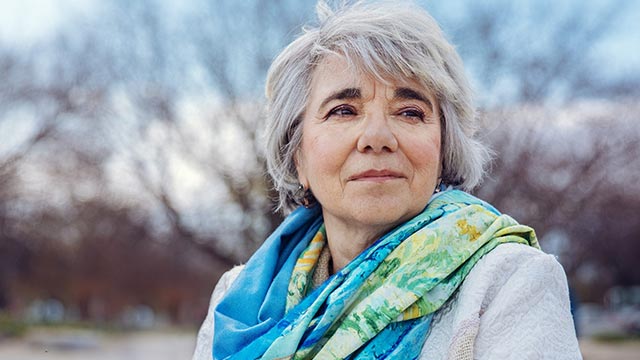This article by Christina Frangou originally appeared in Best Health Canada on June 15, 2021.
After having a heart attack, Vincenza Spiteri DeBonis, 64, shares her experience of learning to take care of herself and how heart disease affects women differently than men.
Five years ago, on March 8, I was washing dishes, and I felt a fatigue I have never felt before. It was a chore to stand there. I wanted to go to bed. But I was having people over for coffee. They came and went, and I had severe pounding in my chest but figured I should start dinner. I couldn’t tell you what was wrong. It wasn’t a pain. It felt like I just didn’t have enough room in my chest for the things I have in my chest, like my heart and my lungs. I took my blood pressure and my pulse—we have the equipment because we need to check my husband’s frequently—and both were very low. I called my family doctor and told her some of the things I was feeling. I said, “Can I come in and see you?” She told me to go to emerg. I thought, Well, that’s rather dramatic, but she insisted.
Looking back, I was quite worried about how it would worry my husband. He’s had significant health issues throughout the years, and I didn’t want to stress him. I’ve known him for 40 years, and we’ve been together for 25. We don’t have kids. That’s another layer of intensity because it’s just the two of us. I understood later that worrying about causing worry to others is a barrier women put in front of ourselves.
But off we went to the hospital I used to work at. Part of my work revolved around health equity. That included gender, but I never personalized it.
The doctor told me I had had a heart attack. I was in denial. I didn’t have the typical blockages or high blood pressure. My ECG was normal. But my cardiac enzymes were very high. I was going on my father’s experience—he’d had cardiac disease, and I’d looked after him, and his ECG was never fine. So I said to the doctor that I’d look into it and asked if I could go home. He said no. My husband was pulling out his hair—he was baffled that I thought I could go home.
In the end, they never did find out the reason for my heart attack. When I was being discharged from the hospital, the cardiologist said I was obviously under terrible stress, and that’s why I had it. That shocked me. I was upset and insulted. I wasn’t stressed. But it was very hard for me that they didn’t know why I had had a heart attack. How could I prevent this from happening again if no one knew what caused it? The uncertainty was a big piece. And I couldn’t get answers.
A close friend who had had heart issues a few years before told me to get a referral to Women’s College Hospital’s cardiac rehab program. When I asked my cardiologist, he said it hadn’t occurred to him that I would be interested in the program. Of course I’d be interested! It was life-changing. There was physical rehab and education. They were able to teach me how and when to use my nitroglycerine spray when I have angina. No one told me before that I should be using nitro spray if I continued to have chest pain. It was meaningful for me to be there with a group of women supporting women and talking to one another.
One of the biggest barriers for me to get care was I didn’t know I was in trouble. I didn’t know what the signs were. I didn’t worry about heart disease, even though my father had cardiac disease for many years and my mom died of a dissected aorta. That wasn’t my life. But I understand now that if I don’t take care of myself, then I’m not going to be able to take care of others.
